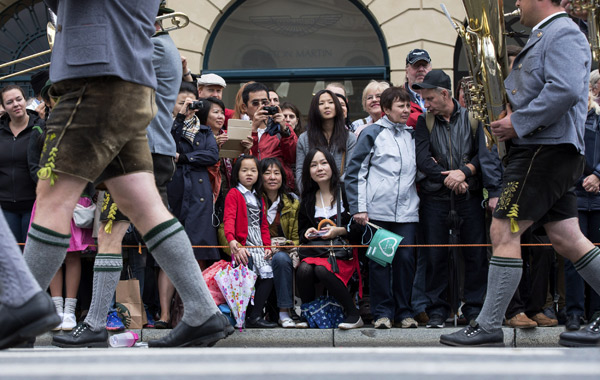
25 Jan, 2015
Strengthening Yuan to increase Europe appeal for Chinese Spring Festival travellers
(China Daily), 2015-01-24 – The yuan’s appreciation against the euro following the quantitative easing program launched in Europe on Thursday is poised to increase the continent’s popularity as a travel destination for Chinese.
The European Central Bank launched a government bond-buying program on Thursday to address a prolonged period of low inflation.
 Chinese tourists watch people dressed in traditional Bavarian clothes march during the Oktoberfest parade in Munich, Germany. The appreciation of the yuan against the euro is expected to widen the popularity of travel to Europe.[Photo/Agencies] |
Together with existing plans to buy private debt and funnel hundreds of billions of euros in cheap loans to banks, the new quantitative easing program will pump 60 billion euros ($69 billion) a month into the economy.
As a result, the euro fell by a full cent against the US dollar to $1.1511 after the new program was announced. On Friday, the central parity rate of the yuan strengthened to 6.9795 against the euro.
The exchange rate movements are unlikely to benefit tour groups anytime soon, as travel agencies usually pay for packages long in advance, business insiders said.
But travelers can still benefit, because Europe is a key region for Chinese travelers to buy luxury items.
Chinese tourists’increasing desire to travel abroad is largely the result of convenient visa application processing and the yuan’s appreciation, said Dai Yu, marketing director of the Tourism Department at Ctrip, a large online travel agency.
Dai said bookings show that this year is the first time that the number of Chinese traveling to overseas destinations has overtaken those traveling at home during Spring Festival, which starts on Feb 19.
Gao Xue, a 30-year-old woman living in Beijing, will fly to Paris on Feb 4 and spend 10 days in France skiing and shopping.
“I’m glad to know the euro has fallen against the yuan just before my trip, so I can shop for more products,” Gao said.
Zhang Minjie, 41, a finance director at a multinational consultancy company in Shanghai, has just returned from a 10-day trip to Italy.
Although she had no firm shopping plans before the trip, saying she already had everything she needs at home and had been to Italy many times, she ended up buying another suitcase for all the purchases she made in Italy.
“The euro’s depreciation makes everything look even more attractive. For example, a Moncler down jacket, which usually costs more than 10,000 yuan in China, costs about 3,000 yuan after a discount and with the currency depreciation factored in,” Gao said.
“It is hard to resist the temptation. Given the current exchange rate, I guess I would shop more crazily if I were in Italy,” she added.
Consultancy company Bain & Co said Chinese travelers’spending on luxury products in Europe increased by 28 percent year-on-year in 2014.
More affluent middle-class people from China have traveled to Europe in the past three years.
According to global travel search site Skyscanner, Iceland is the most popular European destination for this year among Chinese.
High-end travel agency HH Travel in Shanghai said Spain, Portugal and Austria are now more favored by tourists from China with bigger budgets and a higher demand for exclusivity.
Pan Gongsheng, deputy governor of the People’s Bank of China, said at a news conference on Friday that the quantitative easing policy will help to shore up the eurozone economy and strengthen its demand for products produced by China, as Europe is a major trading partner of China.
But it will strengthen the dollar and increase pressure for the yuan to depreciate against the US currency, Pan said.
It will also create more uncertainties in the capital market, since capital outflows from Europe may flow into the US due to strengthening of the dollar, Pan added.
Chen Jia contributed to this story.



Liked this article? Share it!